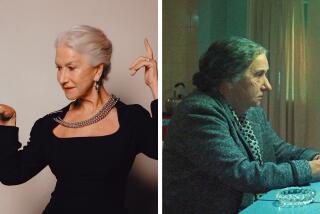Nip/tuck times two
- Share via
Just before her 48th birthday, Jane Kochan decided it was time to do something about her droopy eyes and the deepening lines around her mouth. After months of indecision, the financial manager booked an appointment with a New York plastic surgeon she’d read about in her favorite fashion magazine.
There was only one thing left to do: persuade her twin sister, Joan, to go under the knife too. “I never even considered doing it alone,” says Jane.
Joan, who lives a few floors below her sister in the same Clearwater, Fla., apartment building, quickly agreed. “It’s a competition thing,” says Joan, whose voice sounds nearly identical to her sister’s. “I didn’t want her coming back looking better than me.”
Even before their back-to-back face-lifts, performed according to their birth order (Joan went first), it was difficult for most people to tell the Kochan twins apart. Now they look as similar as ever. “Sometimes,” Joan says, “I will just look at her and think, ‘Wow, I look really great.’ ”
Although cosmetic surgery among twins might strike some people as unusual, it doesn’t seem odd to most identical twins or people who know them. Many twins share an extremely close relationship throughout their lives, and researchers say their close physical resemblance is a significant part of the bond they feel for each other.
Years ago, twins had few options as they grew older and began looking different -- an inevitable change, considering that scientists estimate that only a third of the effects of aging are related to genetic factors. Psychologists who study twins say it is common for them to feel a disquieting sense of loss as they watch their physical appearances gradually become less and less alike.
Still, twins who get cosmetic surgery face a unique set of monozygotic dilemmas. What if one twin wants surgery and the other doesn’t? Twins also have to settle on which procedures they want, which can pose difficulties if one wants a smaller nose or a less noticeable face-lift.
Not surprisingly, the siblings’ different financial situations can affect their decision. Earlier this year, a reader wrote to Dear Abby asking for advice because her twin sister could no longer afford the face-lifts they both had been planning. Abby’s response: If twinship is important, the sister who could afford surgery should forgo it because it could make her feel guilty about abandoning her twin. (The column generated a flurry of responses on Internet sites for twins, with some suggesting the sisters pool their resources and get only the procedures they could afford.)
No one knows for sure how often twins are getting plastic surgery together, because there are no statistics on the topic. But new cosmetic surgery techniques have made these procedures far more accessible to everyone, including twins. And surgeons who specialize in such procedures say they are seeing more twins go under the knife to recapture both their youth and their shared physical identities.
A few cosmetic surgeons in several cities, including Los Angeles, Chicago and New York, now specialize in twin surgeries. And some researchers are starting to use twins in medical studies to help determine the effectiveness of different cosmetic procedures.
“Twins are no different than anybody else. They want to look younger, but they also want to make sure they look as similar as possible,” says Dr. Darrick Antell, a New York plastic surgeon who says he performs nose jobs, face-lifts and breast augmentations on several sets of twins each year.
So why would twins want to recapture the identical appearance they shared as children? Psychologists say many twins grow up used to the idea of looking like someone else; it becomes a central part of how they view themselves and how the world sees them.
“Twins have two identities: their own identity and their twin identity. They have a commonality and a sense of team membership because of what they share, especially their appearance,” says Nancy L. Segal, a professor of psychology at Cal State Fullerton and author of several books on twins.
A generation ago, identical twins often were encouraged by their parents and doctors to accentuate their similarities. In the last 20 years, however, attitudes have shifted, and now many psychologists recommend that twins be encouraged to develop more as individuals. Some psychologists believe that twins should develop a separate life from their sibling to build their own sense of self and help foster other close adult relationships.
“Twins who see their twinship as their raison d’etre have an artificiality to their lives that makes it hard for them as adults,” says Patricia Malmstrom, president of Twin Services, a national counseling service in Berkeley. “They depend too much on their twin and their shared appearance in determining who they are.”
As an identical twin, I understand the discomfort some twins feel when they begin to look different as they grow older. My brother Sean and I have looked nearly identical for much of our lives. As children, we dressed alike until the third grade and later shared everything, including clothes and hairstyles. Many people still confuse us. Now, in my early 30s, I am not sure if I would ever consider cosmetic surgery in my 40s, 50s or beyond. But I know this: If I did get surgery, I would want Sean to do it too.
Segal, of Cal State Fullerton, says there is scant research about the role that physical resemblance plays in the attitudes and behavior of twins. Her own research has found that twins are highly sensitive to even subtle differences in their looks. She’s found that many will consciously or unconsciously correct physical differences that arise between them, such as weight changes or even different eyeglasses or hairstyles. Segal says the law also values their similarity: Twins who have sustained facial scars or burns have received compensation for losing their identical appearance.
Jane Wharton and Marjorie Mehl have lived hundreds of miles from each other for nearly 30 years, but they still wear similar clothes, hairstyles and even glasses. The 69-year-old identical twin sisters had joint face-lifts and eye lifts several years ago after they realized during a vacation together that they were both looking older and different from each other. Jane had survived breast cancer several years earlier and says the chemotherapy made her look older than her sister; Marjorie was 15 pounds heavier than Jane.
Today they like the fact they look as similar as they did as teenagers.
“Looking like your twin is what makes you who you are,” says Wharton, of Fairfax Station, Va. “If we did it alone it would have made one of us the before shot and the other the after.”
John Williams, a Rancho Mirage plastic surgeon who has worked on many twins over the years, says he understands why twins would want to stay looking alike.
He and his twin brother, James -- also a plastic surgeon -- gave each other face-lifts eight years ago. He says he noticed that his brother, who ate poorly and spent more time in the sun, was noticeably aging and figured it was time for both of them to try to turn back the clock. “I kept teasing him he was starting to look like my father, and I think he decided it was time,” Williams says.
Meanwhile, the Kochan twins are planning a trip to their New York surgeon for a cosmetic touch-up next month. The two plan to get another face-lift and more work on their eyes.
“We’ve noticed that we look tired again,” Joan says. “It’s hard to miss when I see her all the time.”
More to Read
Sign up for Essential California
The most important California stories and recommendations in your inbox every morning.
You may occasionally receive promotional content from the Los Angeles Times.












